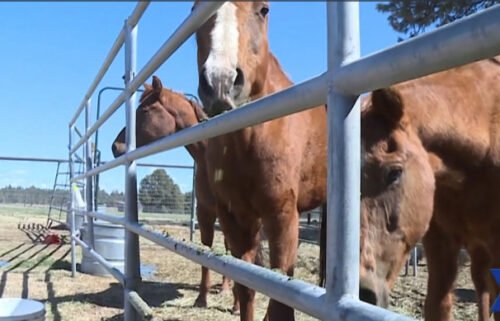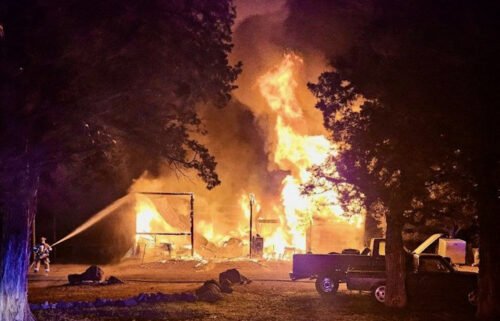Blind Oregonian competing in Paralympics works to bridge gap between mental health, disability
"I loved sports growing up but visually couldn't really keep up with my sighted peers."
BEND, Ore. (KTVZ) -- What's more important: winning a gold medal, completing a master's degree, or helping grow an international sport?
If your name is Eliana Mason, the answer is all of the above, and the sport might be one you've never heard of, called goalball.
It's the only Paralympic sport that's not an adaptation of a previous sport. It was designed after World War II for blinded veterans.
Mason picked up the sport, and has made it a major part of her life.
She had her cataracts removed when she was just nine days old.
Compared to a person with 20/20 vision, Mason needs objects to be 15 times closer to be able to see them.
But she's never let that bother her.
For Mason, adapting to your differences is the name of the game.
"We're athletes, we're resilient, we face adversity in games all the time -- and so, how can we use this to our advantage?” Mason said.
And when she's playing goalball, everything else seems secondary.
"I love this sport so much,” Mason said. “It brings me so much joy, and I feel so empowered when I'm on the court and just getting to be an athlete."
Goalball is designed for those visually impaired.
"So I always joke that goalball is for blind athletes, but you have to visually see it to understand it,” Mason said.
Each player, with varying levels of visual impairment, wears vision-blinding glasses.
Mason and all goalball athletes can see nothing, relying on the sound of bells inside the ball -- and their athletic instinct.
The three-pound ball is thrown up to 40 miles an hour, attempting to make it past three defenders.
The coaches and the fans can only celebrate after a goal, and have to stay completely silent otherwise.
Mason, a Beaverton native, discovered goalball when two Paralympians moved to Oregon, and changed her life forever.
"I loved sports growing up, but visually couldn't really keep up with my sighted peers," she said. "So discovering a sport that was adaptive and meant for blind athletes was life-changing for me.”
Nearly a decade later, she's set to compete in her second Paralympic Games, and add a gold medal to her trophy case, which includes a bronze medal from Rio.
Josh Lucas works with Mason in goalball clinics through the nonprofit Angel City Sports.
"She was a phenomenal player then, and she's only gotten better since,” Lucas said.
He coached against her when she was younger and said she was born to lead.
"She's been that type of leader since she was young -- I could tell,” Lucas said. “She's always been very calm. So it wasn't easy to coach against her, when you can't rattle her."
Rattle her, you cannot.
After the COVID-19 pandemic postponed the Olympics and Paralympics, Mason kept training for the Games, while taking classes for her master's degree in clinical mental health counseling.
"So I want to bridge that gap between mental health and disability and be someone's individual, and come to and work with people who have lived experience and understanding of what it means to live life with a disability -- and bridge that gap,” Mason said.
She said there are a lot of things misunderstood about the Paralympics.
"First off, a lot of people have never heard of them -- and that's just a huge area of education gap,” Mason said. "And so I think people don't recognize if you're a Paralympic athlete, you train and work just as hard as an Olympic athlete."
Mason wants both Paralympic athletes and all people with disabilities to be shown a little more understanding.
"I think a lot of people assume what you can or cannot do,” Mason said. “Instead of assuming what someone is capable of, ask them -- or let them tell you or let them show you."
Lucas knows whether it's on or off the court, Mason's going to change the sport, and a lot of people's lives.
"The impact she could make is immeasurable," Lucas said. "We don't know where it's going to go, but we need people just like her."
While the long-term goal is to expand the game of goal ball as much as she can, the short-term goal is simple: Take home the gold.
"These past four years, all we've been doing is training and working towards this goal," Mason said. "So it's time to put all that into action and show the world what USA goalball is made of.”
Both Mason and her boyfriend, Calahan Young, who competes on the men’s goalball team, are set to compete in the Paralympics on August 24.




